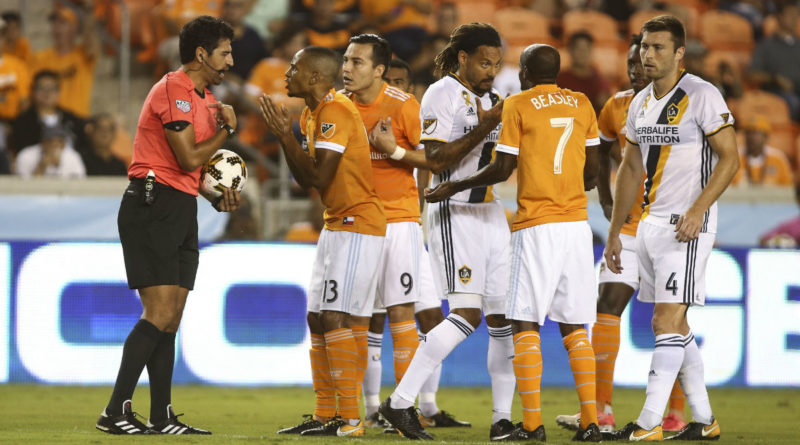Play of the Week 30: Outside Interference
In the latest Play of the Week we are looking at Outside Interference. It’s a subject we haven’t discussed before due to it being a rare occurrence but, when it happens, referees have to know how to react and adhere to the Laws of the Game.
This week’s play is taken from the game between Houston Dynamo and LA Galaxy. During a Dynamo attack, Dynamo forward Erick Torres appears to nudge Galaxy defender Dave Romney in the back, which throws him off balance and he falls to ground.
Referee Fotis Bazakos, from a good position, appears to put his whistle towards his mouth as Torres takes a shot on goal. When the shot is saved by keeper Clement Diop, Bazakos decides to let play continue. Unfortunately, Diop believes that the referee has given his team a free-kick as he hears a whistle from the crowd.
He takes the ball outside the penalty area to take what he believes is a free-kick to his team, and puts the ball on the ground. His actions completely support his claim of hearing a whistle. Why would he deliberately handle the ball outside the penalty area?
Bazakos starts blowing his whistle. Torres, knowing the referee had not awarded a free-kick, immediately plays the ball and moves towards the goal. What are the options for the referee?
- Allow play to continue and award a goal?
- Award a belated free-kick to Galaxy for the initial push?
- Award a free-kick to Dynamo for handball by the keeper?
- Restart play with a dropped ball
The referee could have restarted the game in any of the above ways and any of the options, particularly the first one, would have been highly controversial. What does the law say about “Outside Interference”?
Powers and duties: The referee – Outside Interference
Stops, suspends or abandons the match for any offenses or because of outside interference e.g:
- The floodlights are inadequate
- An object thrown by a spectator hits a match official, a player or team official, the referee may allow the match to continue, or stop, suspend or abandon it depending on the severity of the incident
- A spectator blows a whistle which interferes with play – play is stopped and restarted with a dropped ball
In this situation, the referee gave the safer option but within the Laws of the Game. He also decides to drop the ball at the feet of the keeper rather than a contested dropped ball. The law states:
Dropped Ball
The referee drops the ball at the position where it was when play was stopped unless play was stopped inside the goal area, in which case the ball is dropped on the goal line which is parallel to the goal line at the point nearest to where the ball was when play was stopped.
The ball is in play when it touches the ground.
Any number of players may contest a dropped ball (including the goalkeepers); the referee cannot decide who may contest a dropped ball or its outcome.
The law addresses what are called “manufactured” dropped balls that we have covered in Play of the Week before, when the referee tells the player where to kick the ball, but dropping the ball at the keeper’s feet is standard practice and the keeper then has the right to play the ball anywhere. This was also the safer option for the referee.
In summary, Bazakos adhered to law in this rather unusual play and the safest option, as always, would have been to give a simple defensive free-kick in the first place.
However, he explained his actions to the two captains and in the end, they had to concede that the outcome was fair, and as FIFA keep telling us: “what is fair play and what would the game expect?”

